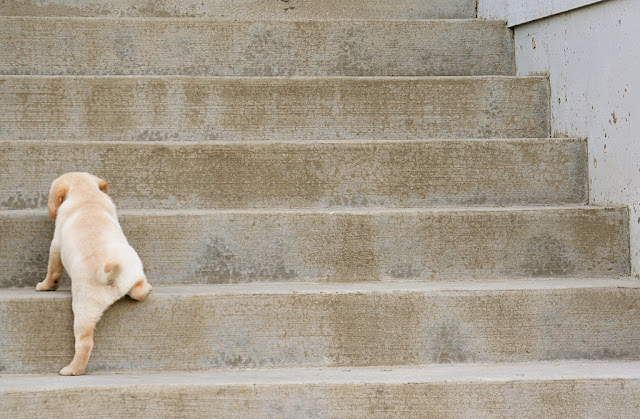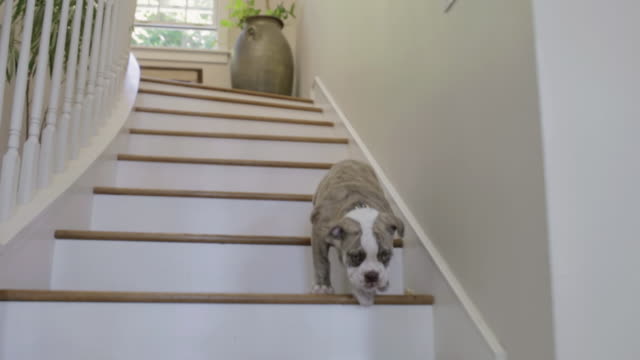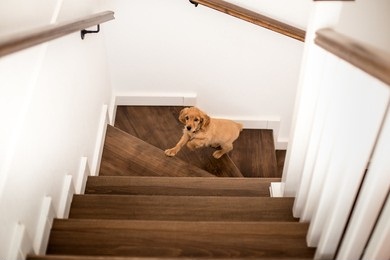When Can Puppies Climb Stairs Safely ?
Nothing beats a dog that has just gotten home and is sniffing about. We've all seen the adorable footage of pups attempting to jump over the stairwell.
Or the films of fathers attempting to teach pups how to climb stairs! These are maybe the sweetest videos we've ever seen. Is this, however, to say that what's happening in those videos is accurate?
When Can Puppies Do Stairs Safely?
Puppies of medium and tiny breeds may safely climb stairs at the age of 12 weeks. Large-breed pups, on the other hand, aren't supposed to tackle stairs until they're at least 16 weeks old.
This is due to the fact that huge dogs are more prone to Hip Dysplasia, which might injure him if he continued to do stairs at an early age.
Are Puppies Allowed To Go Up And Downstairs?
Puppies are permitted to go up and down stairs, but you should keep an eye on them if they are too young. I'd also recommend taking them downstairs if they can't go down one step without leaping — that implies they're too tiny and might fall.
However, most puppies are able to climb stairs at approximately 3 to 4 months of age.
Breeds That Shouldn’t Climb Stairs
Bassett Hound:
- Although Bassett Hounds may climb stairs, they should not do so frequently or without supervision. These dogs are distinguished by their large, lengthy bodies supported by short legs. They're also a lot heavier up front. Simply said, gravity does not work in their favour while climbing stairs!
Dachshund:
- Because of their long, thin body and small legs, Dachshunds are also known as sausage dogs. Climbing stairs will be too taxing for their spines, perhaps resulting in injury.
Corgi:
- Corgis are large dogs with a tendency to develop hip dysplasia. Their whole body weight will rest on their hips as they mount the steps, causing discomfort and even irreversible injury.
Why Shouldn’t Puppy Do Stairs At A Young Age?
Age
According to statistics, 16 percent of pups develop Hip Dysplasia as a result of stair climbing at an early age.
When pups first start climbing the stairs, their bodies will be angled in such a way that it will place too much pressure on his hips.
Let's look at a short comparison of adult and puppy dogs to see what I'm talking about.
Adults will always have their hips level below the stair level. The height of the stairs, on the other hand, will almost always be higher than the level of the hips in pups.
As a result, they must extend their bodies to be able to mount the stairs, putting too much pressure on their hip bones, which might cause them to move.
Larger breeds are worse since their bodies carry a lot more weight, which can lead to Hip Dysplasia at an early age.
This isn't the only reason, though. Another issue is that for a puppy who hasn't yet learned to balance, stairs might be an ideal spot for an accident.
We've all seen footage of pups falling down the stairs and rolling around on the floor; how adorable! These films, however, make me nervous since those puppies might be in excruciating pain if they were hit in the hips directly.
Games on the stairs
I once saw a message on Facebook that said, "Don't make your love the worst puppy's enemy." This indicates that you shouldn't injure your body just because you care about him too much.
On the stairs, I notice a lot of people playing fetch with their babies. While I enjoy playing catch with my dog on the stairs, I only started doing so when she was 8 months old.
Puppy's enthusiasm might be unbalanced, especially when he is still exploring and is unaware of all the surrounding variables. He could have an accident if he runs too rapidly down the stairs.
When you play games on the stairs, the puppy may become overly excited and injure himself.
Psychiatric explains the reasons
Psychiatric, to be specific.
Puppies are scared of stairs from a young age, and we do our best to teach them how to use them. This, on the other hand, has the potential to undermine our faith at an early stage.
This is due to the fact that those puppies may be unfamiliar with the concept of training. As a result, kids may not comprehend that you are attempting to assist them, but they will understand that you are attempting to force them down the frightening steps.
You're jeopardising your friendship with your tiny pal by doing so.
There is another factor that might contribute to mental problems.
Are stairs bad for puppy’s hips?
Unfortunately, many big breeds of dogs are prone to hip problems, such as Hip Dysplasia, which can affect them from puppyhood to adulthood. Dogs with this hereditary genetic disease have problems with the ball and socket system that permits their hip joint to move freely. Instead, the ball and socket will rub and grind continually, causing severe discomfort to canines.
This unnatural motion will cause the joint to deteriorate over time, with some dogs losing their ability to manoeuvre after a few years.
Although the data isn't convincing, there is some indication that climbing stairs before their limbs have fully matured and strong might raise a puppy's chance of getting Hip Dysplasia.
Despite the fact that it is largely genetic, some dogs might develop this illness merely as a result of severe stress on their joints or traumas. Other factors, such as your dog's food and nutrition, exercise regimen, and general weight, might also have an impact.
As a result, before exposing your dog to the stairs, make sure they aren't at danger of getting Hip Dysplasia.
If they fit this description, don't let them climb stairs until they're at least 12 months old.
Mastiffs, Retrievers, Staffordshire Terriers, Shepherds, Rottweilers, St Bernards, and Bulldogs are the breeds most commonly affected with Hip Dysplasia, however any big breed can be affected. Hip Dysplasia can occasionally occur in medium or smaller-sized dogs, although this is uncommon.
If you are concerned about your puppy developing Hip Dysplasia, speak with your local veterinarian.
They will often be able to tell you whether your dog's breed is at a higher risk of acquiring this problem in the future. Dogs can easily enjoy a relatively healthy and pain-free life with adequate care and early treatment.
Are Stairs Bad For a Puppy’s Joints?
Stairs may be highly harmful to a puppy's joints and bones, depending on the breed. It's tempting to think that letting it alone for a few weeks would solve the problem, but you may need to give it even more time.
Their bodies are still developing, and despite their tremendous amounts of energy, they are not designed to run and bounce about everywhere! Climbing the stairs is a physically taxing activity, and owing to their size, certain breeds are more prone to physical problems.
Although it may appear that smaller puppy breeds should not climb stairs as puppies, the taller and heavier ones are more susceptible to illnesses such as hip dysplasia. They're also at risk of developing additional aches and sores in their hips and legs, which can make it difficult for them to move.
Allowing a puppy to perform complicated physical duties when they are still young may promote health problems to emerge sooner than they would otherwise. Unfortunately, they may prevent your four-legged pet from exercising or moving freely for long periods of time.
What Should We Do With Puppies Who Can’t Do The Stairs Yet?
The only options are to either carry the puppy up and down the stairs or to make the dog's living quarters below.
However, if you want to get a puppy, I recommend waiting until the dog is three months old. This is due to a variety of factors, including his behaviour, training, and so on. This is a subject that may be discussed in another article.
Getting a 12-week-old puppy can relieve the strain on your shoulders while also ensuring the puppy's safety.
Is it safe to allow your puppy to climb stairs on its own?
Young pups who climb the stairs unaccompanied are at an increased risk of injury, in addition to the danger of Hip Dysplasia. As a result, even if your dog has successfully navigated stairs previously, you should keep a tight check on them when they are attempting to do so.
Despite the fact that many dog owners believe this is excessive or unneeded, a puppy may badly harm itself with only one terrible mishap. To reduce the chances of this happening, block the stairs whenever you leave the house, even if you are just gone for a few minutes.
If you are unable to prevent access, you can enlist the help of a friend or family member to keep a watch on your dog.
Allowing older puppies (9 months or older) to climb stairs on their own is usually acceptable. They will have developed all of the functions and abilities necessary to climb stairs without difficulty at this point. To prevent your dog from tripping and falling, don't leave any things on the steps. Similarly, you should not let your dog to play or rush up the stairs, since this might raise the danger of an accident. Furthermore, this behaviour is not only harmful for dogs, but it may also cause significant injury to their owners.
How do you teach a puppy to use stairs?
It's a pretty simple chore to teach a puppy how to climb stairs. Treats on the stairs, for example, are a common practise employed by dog owners.
To begin, lay some goodies on the first two or three stairs, gradually encouraging your dog to climb each one. After they've completed this successfully, add a few more goodies higher up and continue the procedure until they've climbed all the way to the top of the stairs.
Make sure to praise your puppy for successfully completing any stairs, as this will reinforce their perception that they have nothing to fear.
You should also remember to be patient, as it may take several tries until they feel comfortable. All puppies are different, and it may take weeks for some to be able to ascend the stairs without becoming trapped or fearful.
Similarly, regardless of how scared you are on the inside, strive to show confidence towards your puppy. When attempting to climb stairs for the first time, they will immediately catch up on your good attitude and feel less scared.
What Should We Do With Puppies Who Can’t Do The Stairs Yet?
When you're thinking of teaching your puppy to climb stairs, keep safety in mind.
Even if you train your puppy to do the stairs when he or she is older than three months, safety is your top priority. When the puppy is three months old, though, it will be simpler to train him, but you must still take care of him.
To make the stairwell safe, take these steps:
1.Make sure the stairwell isn't slick. If your stairs are very slick, you may always add a material to them, such as carpet or anti-slip sticky stair sheets, to make them more stable.
Alternatively, you may follow my lead and just stay by your puppy's side to ensure that he does not fall.
2.Pillows should be placed at the bottom of the stairwell. You'll be sure he doesn't fall over at the last step if you do it this way. You may always teach your dog on less steep steps if your stairs are really steep.
3.Don't carry your dog up the stairwell and leave him in the middle. Always encourage, but never push, your dog to use the stairs.
Consider what would happen if you were scared of snakes and were thrown into a room full of them. It's completely illogical.
You must always reward him with sweets and do it gradually. If the puppy appears to be fearful, that is OK; allow him dog take his time and never yell at him to move.
Treats, chicken, and toys may be placed on the next stairwell to encourage him to take the stairs carefully.
4.Don't say it too many times in a short period of time. I believe you can get your dog to go up and down the stairs once every two days. Don't overdo it; instead, encourage him to do it slowly and gradually without becoming exhausted.
5.Consult your veterinarian if your puppy's bones are weak. It's always best to see your veterinarian if your puppy has a medical issue that affects his bones. He can prescribe medicines to strengthen your puppy's bones, which you can give to him.
6.If your puppy has had an accident, please take him to the veterinarian right away.
Reasons Why Your Dog is Suddenly Afraid of Stairs
Even dogs that used to be able to climb stairs with ease might suddenly reject or be afraid to do so from day to day. This dread can be caused by a variety of factors, some of which are simpler to address than others.
Pain:
- If your dog is approaching senior citizen status or has just had a physical ailment, the stairs may be too difficult for them to ascend. If the damage was not too serious, there's a good possibility they'll mount them again soon, but unfortunately, age cannot be reversed.
Nails that are long:
- We all forget to check our puppies' nails now and again, but they do grow, some faster than others! You may notice that they are limping during long walks, which might be the result of overgrown nails. If you've never trimmed a dog's or puppy's nails before, take them to the veterinarian.
Trauma:
- Your dog or older puppy may be traumatised if they have recently fallen or encountered something traumatic at the bottom or top of the steps. It is up to you to assist them in regaining their confidence. To begin, use the same approach you used to teach your puppy to climb the stairs to conquer the fear.
More about puppies and stairs
The most difficult task that puppies confront in your house is figuring out how to get up and down the stairs. Stairs can appear to newborn pups to be mountains, as they go uphill for what seems like an eternity.
Even for a puppy of any age, taking one step at a time may be a tremendous endeavour, and it might take months for them to learn the art of properly scaling them.
Unfortunately, it is very uncommon for senior dogs to never completely master the art of stair climbing, with many opting to avoid them later in life.
As a result, while your puppy is still young, you must educate them how to accomplish this. Without this ability, elderly dogs might develop severe phobias about mounting stairs, refusing to follow their owners upstairs or entering houses with many steps.
However, many dog owners forget to ask themselves one question before performing this job, a one that, if left unanswered, can lead to many younger canines suffering long-term damage. When are pups allowed to climb stairs?
How do you know if Your Dog Has a Head Injury?
A head wound can sometimes be detected immediately owing to bleeding, although this is not always the case.
If your dog looks to be stumbling or disoriented, you must take them to the veterinarian as soon as possible.
Take them to the vet right away if they become unconscious or show any other signs of a concussion!
Some brain injuries can be treated, but in any instance like this, it's preferable to get them addressed as quickly as possible.
After tumbling down the steps, your furry companion may stand up and appear to be OK. However, this does not imply that they are, and unfortunately, they are not always capable of alerting you to a problem.
Although prevention is always preferable than cure, if your four-legged pet has fallen down the steps, get medical attention immediately. If they already have joint illness or hip dysplasia, the need for early assistance is much greater.
Conclusion
Everyone wants his dog to develop quickly and romp about the home cheerfully. However, aren't we all concerned about the safety of our canine companions?
That is why we must always look after them; we must not urge them to ascend the stairs at a young age, since this may injure their small hips.








